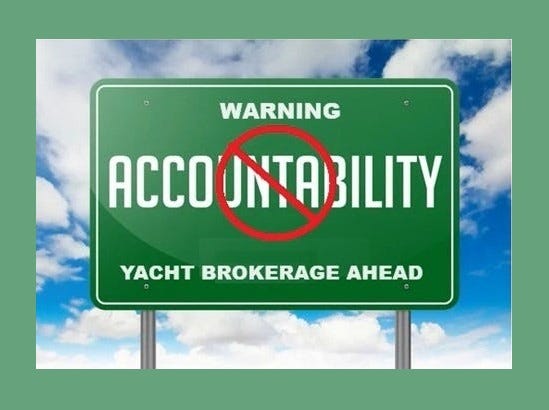Suits Against Yacht Brokerages Subject Industry to Closer Scrutiny
A Byproduct of Litigation Is Often Unwanted Exposure, Such as This Opinion Piece
Special Coverage Announcement: Loose Cannon and Phil Friedman (For Yacht Builders, Buyers & Owners) have teamed up to cover a big legal challenge to the American yacht sales system. Two class-action lawsuits have been filed so far, accusing the yacht broker establishment of engaging in a monopoly. This litigation could take a couple years to reach a conclusion.
We’ve divided up the work this way: Loose Cannon covers the court cases in a hard-news fashion, while Friedman1 writes a series of commentaries about the structure, practices and foibles of the yacht brokerage business. We will be encouraging comments and full-blown rebuttals from marine industry people. You can read all our stories here or at For Yacht Builders, Buyers & Owners.
This is the first of such commentaries.
Only two states in the USA regulate the yacht and ship brokerage business —California and Florida. In all the other states, yacht brokerage is unregulated by government or even quasi-government bodies. In some areas of the nation, there are voluntary associations which nominally seek to improve the level of competence and operating standards of their members. The most notable of these is the Certified Professional Yacht Brokers Program, which was initially conceived by the Yacht Brokers Association of America (YBAA), but is now run by a consortium of seven associations representing yacht brokers in North America and abroad.
It’s important to keep in mind that voluntary means voluntary, and that compliance with the propagated standards of a voluntary association can be haphazard, at best — unless combined with an exceptionally robust system of review, discipline and expulsion to deal with failure to act in accord with the standards of the umbrella organization.
Indeed, even in California and Florida, where government regulation and licensing of yacht brokerage exists, the lack of proactive enforcement leads one reasonably to question the efficacy of the system that’s nominally in place.
Even where the yacht brokerage business is government regulated and a set of rules and operating procedures clearly laid out, confusion abounds in the public mind. Marketing pieces put out by various boating industry associations frequently ascribe to licensed yacht brokers and sales people knowledge and expertise that few, if any of them possess—at least, not to the level implied.
Keep reading with a 7-day free trial
Subscribe to LOOSE CANNON to keep reading this post and get 7 days of free access to the full post archives.






